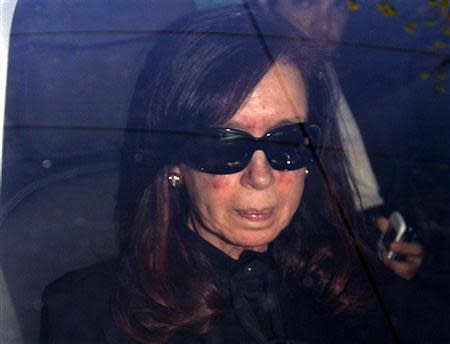Argentina's Fernandez to undergo head surgery as elections near

By Guido Nejamkis and Asher Levine BUENOS AIRES (Reuters) - Argentine President Cristina Fernandez will undergo surgery on Tuesday to treat a head injury, sidelining her ahead of a key mid-term election and at the apex of a bitter court battle with some of the nation's creditors. The president's condition, described as a subdural hematoma or blood on the brain, may have come from hitting her head during a fall she took in August. On Saturday she was ordered to rest for a month due to her condition. Fernandez was re-admitted to hospital on Monday for pre-surgical checks after reporting a tingling sensation in her left arm, said doctors at the Buenos Aires medical center where she is being be treated. The operation involves opening the skull and draining blood that has pooled between the brain and the skull. "The initial recommendation for rest and observation issued on Saturday ... was modified," said a statement from the Fundacion Favaloro hospital. "Considering these symptoms, the president's medical team is suggesting surgery." The U.S. Supreme Court on Monday declined to hear a preliminary appeal filed by Argentina over its battle with hedge funds that refused to take part in two debt restructurings that sprang from the country's 2002 default. Fernandez vows never to pay the holdouts, whom she derides as "vultures" for picking over the bones of the 2002 default, which pushed millions of middle class Argentines into poverty. The surgery will also keep the combative 60-year-old leader out of action ahead of October 27 mid-term congressional elections that will determine how much legislative clout she enjoys during her final two years in office. Fernandez's popularity is hovering at about 34 percent, a little more than half of what it reached in October 2011, according to data from local consulting group Management & Fit. Recent polls have indicated the government could lose control of Congress in the mid-term vote, an outcome that would deprive Fernandez of the chance of introducing a constitutional reform that would allow her to run for a third term in 2015. Analysts remained skeptical over whether any feelings of sympathy would be enough to boost her administration's candidates in the election. Approval of her administration jumped more than 20 points after her husband, former President Nestor Kirchner, died from a heart attack in October 2010. "(The hematoma) will probably generate some sympathy, which could help her candidates a bit, but is unlikely to materialize into a major change of electoral preferences," Eurasia Group analyst Daniel Kerner wrote on Monday. "The demand for change and discontent with low growth, high inflation and crime will likely be more important than (Fernandez's) health issues." Fernandez was first elected in 2007 as Argentina was recovering from its catastrophic 2002 debt default. Her protectionist trade policies, currency controls and nationalization of the country's main airline, oil company and private pension system have confirmed Argentina as an outcast of the international markets while double-digit inflation eats away at the savings of average Argentines. (Editing by Hugh Bronstein and Cynthia Osterman)
